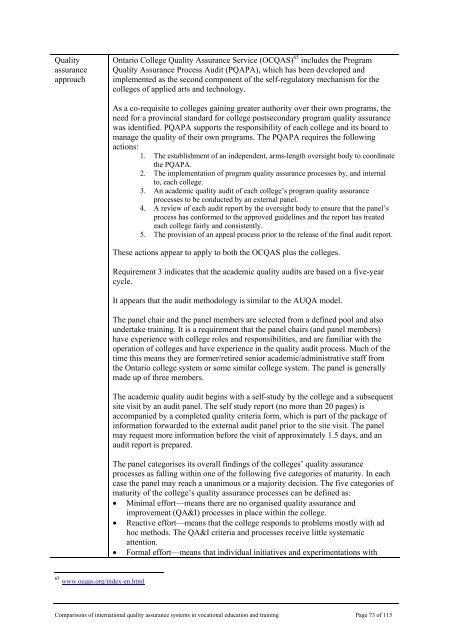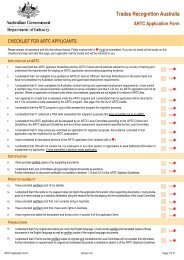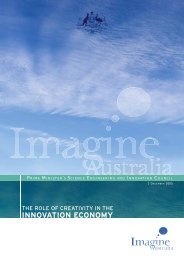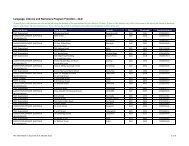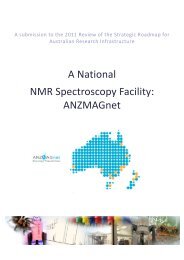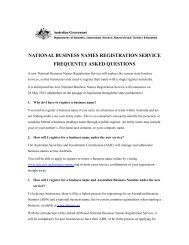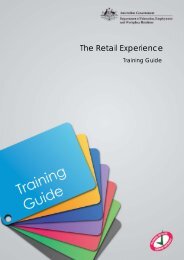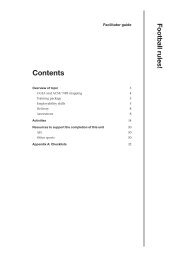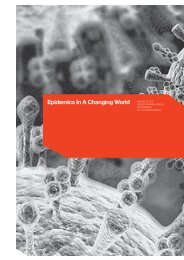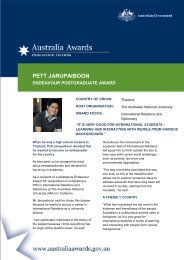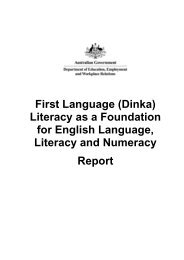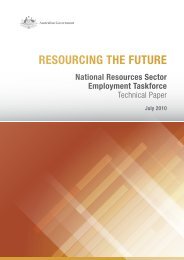Review - Department of Innovation, Industry, Science and Research
Review - Department of Innovation, Industry, Science and Research
Review - Department of Innovation, Industry, Science and Research
You also want an ePaper? Increase the reach of your titles
YUMPU automatically turns print PDFs into web optimized ePapers that Google loves.
Quality<br />
assurance<br />
approach<br />
Ontario College Quality Assurance Service (OCQAS) 65 includes the Program<br />
Quality Assurance Process Audit (PQAPA), which has been developed <strong>and</strong><br />
implemented as the second component <strong>of</strong> the self-regulatory mechanism for the<br />
colleges <strong>of</strong> applied arts <strong>and</strong> technology.<br />
As a co-requisite to colleges gaining greater authority over their own programs, the<br />
need for a provincial st<strong>and</strong>ard for college postsecondary program quality assurance<br />
was identified. PQAPA supports the responsibility <strong>of</strong> each college <strong>and</strong> its board to<br />
manage the quality <strong>of</strong> their own programs. The PQAPA requires the following<br />
actions:<br />
1. The establishment <strong>of</strong> an independent, arms-length oversight body to coordinate<br />
the PQAPA.<br />
2. The implementation <strong>of</strong> program quality assurance processes by, <strong>and</strong> internal<br />
to, each college.<br />
3. An academic quality audit <strong>of</strong> each college’s program quality assurance<br />
processes to be conducted by an external panel.<br />
4. A review <strong>of</strong> each audit report by the oversight body to ensure that the panel’s<br />
process has conformed to the approved guidelines <strong>and</strong> the report has treated<br />
each college fairly <strong>and</strong> consistently.<br />
5. The provision <strong>of</strong> an appeal process prior to the release <strong>of</strong> the final audit report.<br />
These actions appear to apply to both the OCQAS plus the colleges.<br />
Requirement 3 indicates that the academic quality audits are based on a five-year<br />
cycle.<br />
It appears that the audit methodology is similar to the AUQA model.<br />
The panel chair <strong>and</strong> the panel members are selected from a defined pool <strong>and</strong> also<br />
undertake training. It is a requirement that the panel chairs (<strong>and</strong> panel members)<br />
have experience with college roles <strong>and</strong> responsibilities, <strong>and</strong> are familiar with the<br />
operation <strong>of</strong> colleges <strong>and</strong> have experience in the quality audit process. Much <strong>of</strong> the<br />
time this means they are former/retired senior academic/administrative staff from<br />
the Ontario college system or some similar college system. The panel is generally<br />
made up <strong>of</strong> three members.<br />
The academic quality audit begins with a self-study by the college <strong>and</strong> a subsequent<br />
site visit by an audit panel. The self study report (no more than 20 pages) is<br />
accompanied by a completed quality criteria form, which is part <strong>of</strong> the package <strong>of</strong><br />
information forwarded to the external audit panel prior to the site visit. The panel<br />
may request more information before the visit <strong>of</strong> approximately 1.5 days, <strong>and</strong> an<br />
audit report is prepared.<br />
The panel categorises its overall findings <strong>of</strong> the colleges’ quality assurance<br />
processes as falling within one <strong>of</strong> the following five categories <strong>of</strong> maturity. In each<br />
case the panel may reach a unanimous or a majority decision. The five categories <strong>of</strong><br />
maturity <strong>of</strong> the college’s quality assurance processes can be defined as:<br />
• Minimal effort—means there are no organised quality assurance <strong>and</strong><br />
improvement (QA&I) processes in place within the college.<br />
• Reactive effort—means that the college responds to problems mostly with ad<br />
hoc methods. The QA&I criteria <strong>and</strong> processes receive little systematic<br />
attention.<br />
• Formal effort—means that individual initiatives <strong>and</strong> experimentations with<br />
65 www.ocqas.org/index-en.html<br />
Comparisons <strong>of</strong> international quality assurance systems in vocational education <strong>and</strong> training Page 73 <strong>of</strong> 115


